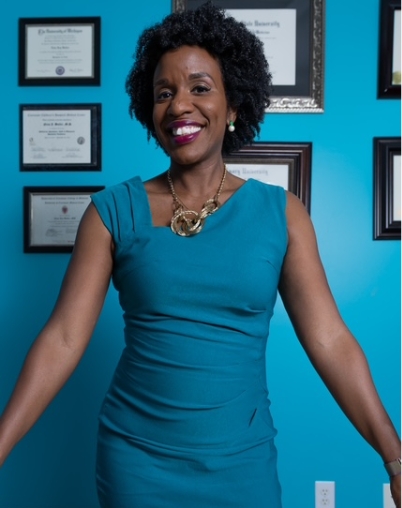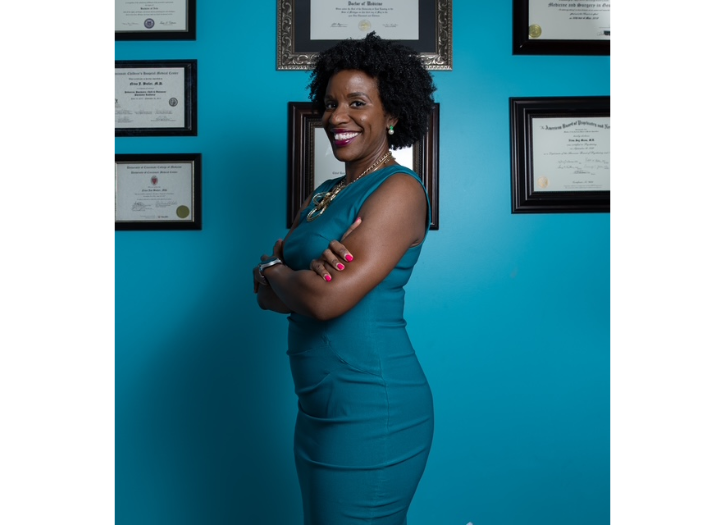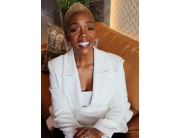July is Minority Mental Health Awareness Month. Dr. Nina Joy Mena, known as Dr. NJoy, is an Atlanta-based community psychiatrist, author, podcaster, and motivational speaker, passionately dedicated to addressing mental health issues and reducing the stigma of mental illness within the Black community. Dr. NJoy is double board-certified in General Psychiatry and Child & Adolescent Psychiatry and holds medical licenses in twelve states.

What was the inspiration behind your career in mental health?
Dr. NJoy: My journey began with my own family’s experiences—navigating mental illness and substance use up close. I also saw how stigma in the Black community kept so many from getting the help they needed, often resulting in ER visits, medical bills, or, tragically, suicide. I knew I wanted to be part of the solution. My life’s mission is to inspire joy in others. Even my name—NJoy—is a reminder that we can choose joy, even in the face of stress, trauma, and adversity. Through resilience, healing, and intentional wellness, I help others see that joy is still possible.
How can people find joy while facing mental health struggles?
Dr. NJoy: Joy and struggle can exist at the same time. You don’t have to be completely healed to experience peace, laughter, or a sense of purpose. Finding joy while facing mental health challenges means being intentional. It’s choosing to slow down, to breathe, to connect, to reflect. Sometimes, it’s as simple as allowing yourself one good moment in the middle of a hard day. I always say: Joy isn’t just a feeling—it’s a practice. Through my INSPIRE-Joy method, I help people build joy from the inside out—focusing on integrity(mental health), nurture (physical health), stability(financial health), purpose (aspirational health), intimacy(social health), resilience, and empowerment. And just as importantly, choosing your journey to joy is choosing to begin your healing. It’s saying, “I may be hurting, but I’m worth the work. I may be struggling, but I still deserve joy.” That single choice can change everything.
Why is it important to have therapists who understand your culture?
Dr. NJoy: Because healing can’t happen in a space where you don’t feel seen. Culture shapes how we grieve, how we express emotions, how we define strength, and how we survive. When a therapist understands your culture, they’re not just treating symptoms—they’re honoring your story. For Black clients and other people of color, it’s exhausting to constantly have to explain things like code-switching, generational trauma, microaggressions, or why “strong Black woman” syndrome isn’t a compliment—it’s a survival mechanism. Culturally competent therapists don’t just offer empathy—they offer safety. They recognize the unique burdens we carry and help us unpack them without judgment. That understanding builds trust, and trust is where true healing begins. At the end of the day, therapy should feel like a place where you can take the mask off—and for many, that starts with being understood.
What advice do you have for someone afraid to ask for help?
Dr. NJoy: First, I want them to know this: asking for help is not weakness—it’s wisdom. It means being recognized that they matter. That their peace, healing, and sanity are worth fighting for. Fear often tells us that no one will understand, that we’ll be judged, or that we have to figure it out alone. But that’s a lie we’ve been conditioned to believe—especially in communities where strength has meant silence. My advice? Start small. Talk to someone they trust. One has to be honest enough to admit that they deserve more than survival. Help doesn’t make you broken. Help makes you brave.
What do you hope will change for minority mental health in the future?
Dr. NJoy: I hope we reach a future where getting help is seen as strength—not shame—in every Black and Brown household. Where therapy is as normalized as doctor’s visits. Where kids grow up with the language to talk about their emotions, not just suppress them. I want to see more access, more representation, and more healing. I hope we continue to build systems that honor cultural differences, not pathologize them. That means more providers of color, more trauma-informed care, and more safe spaces where people can show up fully, without judgment. And I hope we stop celebrating survival and start prioritizing joy. Because thriving is our birthright, not the exception. My work, my books, my platform—they all exist to help push that future forward.
How can readers connect online?
Dr. NJoy: Connect online: https://www.instagram.com/dr.njoy.life?igsh=cXVpeG54cXg2eXB0







Add Comment
You must be logged in to post a comment.